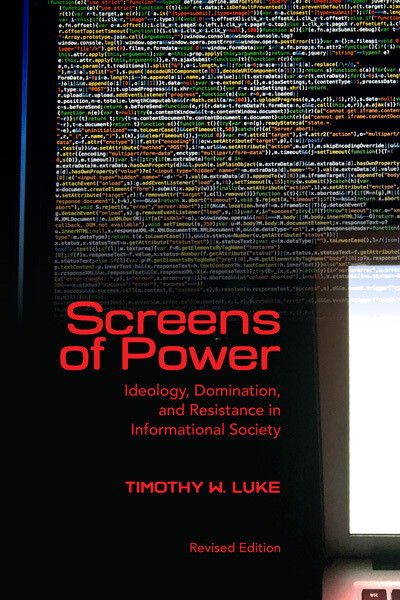Screens of Power: Ideology, Domination, and Resistance in Informational Society (paperback)
Screens of Power: Ideology, Domination, and Resistance in Informational Society
Revised Edition
by Timothy W. Luke
With a Foreword by Ronald J. Deibert
Also available in Kindle ebook format at Amazon.com.
This new edition of Screens of Power: Ideology, Domination, and Resistance in Informational Society, first published in 1989, reintroduces the innovative critique of informational culture, politics, and society outlined by Timothy W. Luke in Telos and other publications during the late 1970s and early 1980s. Working with insights derived from the Frankfurt School, Christopher Lasch, Michel Foucault, Guy Debord, and Jean Baudrillard, Luke maps out decisive conflicts and contradictions that leading modern economies and societies faced during the Cold War. At stake here is how to organize effectively the challenging political, social, and cultural transitions from industrial to informational institutions, practices, and values—a far-reaching transformation that continues to unfold today. The original edition has influenced research in the fields of visual studies, sociology, rhetorical analysis, politics, mass communications, government, information studies, economics, and cultural studies. During the COVID-19 pandemic of the 2020s, far more people are reconfiguring key aspects of their everyday life to flow across billions of screens. As they connect through the signs and systems of application platforms, computer networks, data centers, and software servers, this new edition highlights the significance of Luke's original explorations of the politics behind informatics as well as Telos's ongoing project of developing "a critical theory of the contemporary."
Timothy W. Luke on the Telos Press Podcast
On the Telos Press Podcast, David Pan talked with Tim Luke about a range of topics related to Screens of Power, including the definition of informational society, the transformation of consumers into data and capital assets, the shift toward permissive individualism and consumerism, the commodification of tradition and religion by televangelism, the rise of politics as televisual spectacle, the changing character of social movements, and the role of critics and intellectuals.
Praise for Timothy W. Luke's Screens of Power
"Screens of Power was a pathfinder when it was first published in 1989. Now it is a classic. Timothy W. Luke has added an introduction to the revised edition, with a foreword by Ronald J. Deibert. Luke investigates the politics of the material and symbolic production of meanings utilizing semiotic approaches and critical theory to provide a post-Marxist critique of postindustrialism and to examine power and ideology in informational society. The original book commented on the ‘oppositional politics’ of the 1980s. It is remarkable how this new revised edition speaks to us today."
—Michael A. Peters, Distinguished Professor, Beijing Normal University, PR China, and Emeritus Professor, University of Illinois
"The most frightening implication of Luke’s study lies in the possibility that, with the increasing ability of modern Western institutional structures to administer and shape the subjective behavior of individuals, one’s own subjective and ethical development, indeed, one’s own entire identity, becomes increasingly indistinguishable from the forces currently governing capitalist political economy. Given the increasing ability of capitalist relations to produce a totality which can define every aspect of our lives, Luke’s work leaves us with the possibility that the current evolution of advanced capitalism has mastered the ability to continue its creeping control of ‘private’ behavior as well as ‘public’ behavior not through domination, but through our own submission to the forces of consumption currently behind the function of capitalist political economy."
—New Political Science
"Screens of Power provides an excellent introduction to a semiotic reading of economic and social processes in today’s image-dominated environment."
—American Journalism
"In an era of mindless Marxism-bashing, Luke’s book is truly refreshing. It testifies to the persistent theoretical relevance of the best work in the neo-Marxist tradition."
—Journal of Politics
Contents
Foreword: Back to the Future
Ronald J. Deibert
Preface to the Revised Edition
Acknowledgments
Part I: Scanning the Screens of Power
Introduction to the Revised Edition
Introduction to the First Edition
Part II: Creating a Post-Marxist Critique of Postindustrialism
1. Finding New Puzzles of Power in the Riddle of the Commodity
Part III: Power and Ideology in Informational Society
2. The Contradictory Capital of Culture: The Neoconservative Critique of the Cultural Contradictions of Capitalism
3. From Fundamentalism to Televangelism
4. Regulating the Haven in a Heartless World: The State, Firm, and Family under Advanced Capitalism
5. Discourses of Charisma and Televisual Electoral Politics
6. History as an Ideopolitical Commodity: The 1984 D-Day Spectacle
7. “Packaging” Chernobyl: The Manufacture of Meaning from a Transnational Ecological Disaster
Part IV: Oppositional Politics in Informational Society
8. Power and Resistance in Informationalizing Postindustrial Societies
9. The New Left, Critical Intellectuals, and Social Revolution: The Role of the New Media in the Politics of Image
Postscript
ISBN 978-0-914386-80-3 (paperback) • 978-0-914386-81-0 (ebook)
Pub. date: December 1, 2020
340 pages



